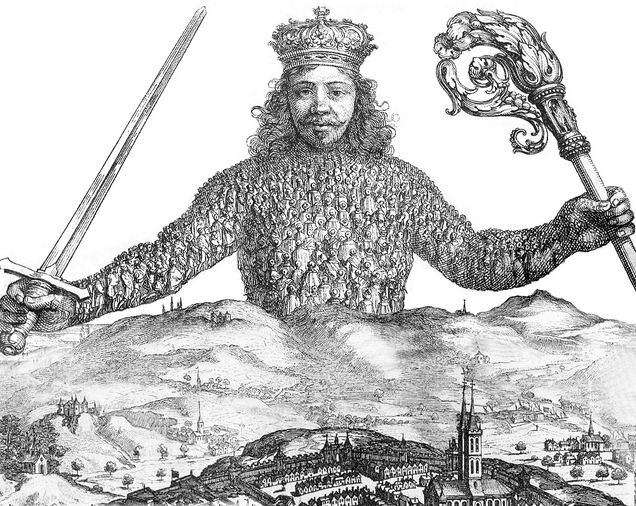Home Affairs: from hobbit to Hobbes
Posted By Mike Scrafton on October 25, 2017 @ 14:30

The Home Affairs Department’s secretary-designate, Mike Pezzullo, provided an explanation [1] of the ‘philosophical context’ behind the new institution in a recent presentation. Even allowing for the public nature of the event and the need to be entertaining on such occasions, the presentation’s language raises unsettling questions.
Pezzullo introduced a straw man by raising Hobbes’ Leviathan. Hobbes’ Sovereign had didactic value for Pezzullo by emphasising how international trade, mass people movements and global communications have subverted the former significant capacity of government to manage its borders. Whereas in the past managing borders was primarily a physical activity within the control of government officials, those borders have become permeable through new technologies and international trade arrangements.
However, Australia doesn’t have an all-powerful sovereign to whom personal freedom has been ceded in return for security from domestic and external threats. It is a democratic state that draws its political culture from a combination of English common law and the prerogatives of England’s unwritten constitution, the values of the French and American revolutions, and its own constitution and history.
The real question is why the existing institutions of Australia’s pluralistic representative democracy are inadequate for the contemporary security task. From what will Australians be better protected as a result of this new organisation, and are the civil and political costs worth it? Australia is apparently ill-prepared for the ‘emerging … “dark universe”’ of globalised ‘terror, crime, and indeed evil’. Reassuringly, Pezzullo doesn’t think that we’re facing the ‘end of days’, although to avoid Armageddon Australia must ‘purposefully attack the problem and make it not so’. But even allowing for rhetorical flourishes, he does seem to be arguing that the metaphorical equivalent of Sauron lies out there beyond our borders.
At one level, that assessment is correct and deeply important. Globalisation and technology have facilitated [2] the appalling criminal activities of human trafficking and slavery, child sexual exploitation, and drug smuggling as well as money laundering, fraud and cybercrime. Opportunities have increased [3] for political and commercial corruption, organised crime, tax evasion and sanctions busting. Extremist violence—including the recruitment to and the proselytising of extremist causes—has been transformed [4].
According to Pezzullo, Australians, like ‘comfortable hobbits’, are blissfully unaware of the grave dangers that exist just beyond their borders. They hold on to an ‘obsolete’ notion that ‘home is safe’ and ‘outside is dangerous’. The hobbits, and presumably Australians in general, are ignorant of ‘the sacrifices that have been endured to keep them safe’. Those assertions are yet to be demonstrated.
Australia’s security and law enforcement organisations do a vast amount of unrecognised work in countering criminals, extremists, spies and cyber-saboteurs by disrupting and anticipating their nefarious activities. It’s a difficult and demanding task and the nature of a lot of their work is necessarily clandestine and covert. The anticipation, disruption and apprehension of criminals and extremists has saved many lives and much property. The increasing complexity and interconnectedness of the world is making their job harder.
Pezzullo’s proposed response to this mounting challenge is radical and revolutionary and alarming. It amounts to more than ensuring that the security institutions are strengthened and better resourced. The ‘state … has to repurpose and re-engineer itself’. Apparently, ‘we need to rethink the structure of government and, indeed, the architecture of security’. That encompasses the protection of Australia’s ‘democratic institutions in relation to foreign interference and political subversion’ and ‘the cohesion of our communities in terms of their fragmentation and fracturing’.
It’s undeniable that Pezzullo’s experience in defence and security management gives him far greater insight than the average citizen into the specifics of the contemporary threats posed by criminals, potential adversaries and violent extremists. His contention that Australia must adapt, and perhaps profoundly, its ‘models of policing, security intelligence, customs, immigration, transport security, [and] border protection’ is undoubtedly based on that experience and knowledge.
But it doesn’t automatically follow from his presentation that a powerful ‘single accountable minister’ who is ‘at the apex of the entire security apparatus’ is the only or even the best solution. In Pezzullo’s vision, the minister will be accountable politically to the Prime Minister and Cabinet for this security apparatus as it ‘embed[s] itself invisibly into global networks and supply chains, and the virtual realm, in a seamless and largely invisible fashion, intervening on the basis of intelligence and risk settings. Increasingly, at super scale and at very high volumes’. That sounds frightening.
The context and brevity of Pezzullo’s remarks and the unclassified nature of the event placed significant constraints on how direct he could be. If the hobbit analogy is taken at face value, Australians are potentially vulnerable to ‘fake news and global campaigns of information subversion and psychological warfare designed to undermine our democratic institutions and public discourse’ from beyond the allegorical Brandywine. How this is to be protected against in our democracy isn’t clear.
There’s always a conflict between liberty and security. Liberty [5] here is ‘the collective term for fundamental civil, political and social rights, in addition to physical liberty’, and includes the right to privacy. There are some protections [6] of these rights in Australia, although they’re already heavily qualified [7] in relation to some security matters.
However, the lengths Pezzullo indicates that government now needs to go to in its Manichean struggle seem extraordinary. The concrete detail is missing about what the ominous-sounding disruption, transformation, embedding, repurposing, re-engineering and rethinking of the basic institutions will do to our pluralistic democracy. How will Australians be affected?
Until we have clarity in these areas, we won’t know the terms of that other Hobbesian contribution to political philosophy: the social contract [8].
Article printed from The Strategist: https://www.aspistrategist.org.au
URL to article: https://www.aspistrategist.org.au/home-affairs-from-hobbit-to-hobbes/
URLs in this post:
[1] explanation: https://www.border.gov.au/about/news-media/speeches-presentations/secretary-remarks-to-the-trans-tasman-business-circle
[2] facilitated: http://www.nationalcrimeagency.gov.uk/publications/807-national-strategic-assessment-of-serious-and-organised-crime-2017/file
[3] Opportunities have increased: https://www.unodc.org/wdr2017/field/Booklet_5_NEXUS.pdf
[4] transformed: http://www3.weforum.org/docs/GRR17_Report_web.pdf
[5] Liberty: https://link.springer.com/chapter/10.1007%2F978-94-6265-026-8_2
[6] some protections: https://www.humanrights.gov.au/how-are-human-rights-protected-australian-law
[7] heavily qualified: http://www.huffingtonpost.com.au/2016/10/20/australias-anti-terror-laws-savaged-by-human-rights-watch_a_21587751/
[8] social contract: https://plato.stanford.edu/entries/hobbes-moral/
Click here to print.